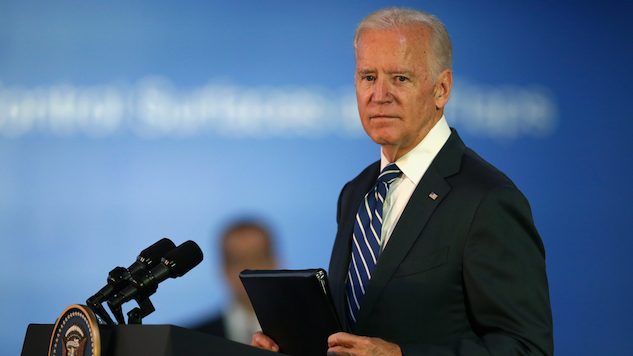Joe Biden’s 1993 Crime Bill Speech Is Worse Than You Think
Photos courtesy of Getty
There’s a Facebook post going around today comparing the language used in speeches surrounding the 1994 Crime Bill by Joe Biden and Bernie Sanders. You can imagine the difference—Biden, chair of the Senate Judiciary Committee, had what CNN describes as a “central role in shaping and shepherding the tough-on-crime bill,” and his words were practically belligerent, while Sanders—then in the House—classified it as a bill of “punishment” and “retribution” and “vengeance.” That said, Sanders ended up voting for the bill, since the Violence Against Women Act was attached to it and he was forced to make a choice (he’s since said he regrets the choice). But it’s Biden’s rhetoric, the year before President Clinton signed the bill into law, that is truly stunning.
Watch part of it here:
this Biden clip from 1993 is…outright fascist. 10X worse than Clinton’s “super predator” line (via @KFILE) https://t.co/k8d0Icq50mpic.twitter.com/77aDBUKznP
— Adam H. Johnson (@adamjohnsonNYC) March 7, 2019
A few choice quotes:
“We have predators on our streets that society has in fact, in part because of its neglect, created…they are beyond the pale many of those people, beyond the pale. And it’s a sad commentary on society. We have no choice but to take them out of society….a cadre of young people, tens of thousands of them, born out of wedlock, without parents, without supervision, without any structure, without any conscience developing because they literally … because they literally have not been socialized, they literally have not had an opportunity….we should focus on them now….if we don’t, they will, or a portion of them, will become the predators 15 years from now.”
And:
“The consensus is A), we must take back the streets. It doesn’t matter whether or not the person that is accosting your son or daughter or my son or daughter, my wife, your husband, my mother, your parents, it doesn’t matter whether or not they were deprived as a youth. It doesn’t matter whether or not they had no background that enabled them to become socialized into the fabric of society. It doesn’t matter whether or not they’re the victims of society. The end result is they’re about to knock my mother on the head with a lead pipe, shoot my sister, beat up my wife, take on my sons.”
And:
“I don’t care why someone is a malefactor in society. I don’t care why someone is antisocial. I don’t care why they’ve become a sociopath. We have an obligation to cordon them off from the rest of society.”
This is the language of demonization, and even without the underlying racial element, it would be offensive to describe Americans this way, and to brush aside the societal conditions that lead to violent crime as though they’re irrelevant. But, of course, the racial element is not just present, but profound. It’s impossible to read these remarks, complete with dehumanizing rhetoric, without coming to the conclusion that Biden is, in fact, talking about black crime. And it’s not mistake that the ’94 crime bill overwhelmingly affected black Americans. As Thomas Frank wrote, in a comprehensive critique in The Guardian, it “destroyed lives”:
But what is most shocking in our current journo-historical understanding of the Clinton years is the idea that the mass imprisonment of people of color was an “unintended consequence” of the 1994 crime bill, to quote the New York Daily News’s paraphrase of Hillary Clinton. This is flatly, glaringly false…
Frank points to the “three strike” provision which made felons of people convicted of even minor drug crimes, mandatory minimum sentences, and reduced opportunities for parole. It also perpetuated the sentencing disparity between crack and cocaine, which resulted in disproportionate punishments between black and white criminals.
In response to the CNN story, Biden’s team noted he was responding to Republicans who were accusing Democrats of being “soft on crime,” but that seems to be part of the problem—if it’s true, he let Republicans bully him into demonizing his own constituents and making light of the societal circumstances at the root of the crime. If it’s not true, then those words represent his true views, which is even worse.
Biden’s team argues his strong rhetoric was in response to GOP arguments that Democrats were weak on time & he supported diverting 1st time offenders from the system. Biden, they argued, supported non-violent crimes being kept away from harsher penalties. https://t.co/JA8WJAUAZCpic.twitter.com/jp4cY02VQx
— andrew kaczynski (@KFILE) March 7, 2019
And what remains true is that Biden was one of the bill’s great champions. His was not accidental support, and his identification with the legislation was so complete that, as CNN reports, “he has referred to it over the years as ‘the Biden bill.’” He even defended it as recently as 2016, but now that he’s running for president, he allegedly considers it a mistake.
Nor is this an isolated incident in his career—here he is in 1991 bragging about another crime bill in which he pushed for expansion of the death penalty:
Want to know what Biden will face in 2020?
Here he is in 1991 bragging his crime bill “made it a death penalty offense for everything but jaywalking.” (h/t @cspan) pic.twitter.com/ciLLGQK3gC
— Matt Gorman (@mattsgorman) March 7, 2019
These are issues Biden will have to face if he runs for president, which appears likely. Polls today indicate he’s the frontrunner, narrowly, but the reaction to videos like these will determine whether that support is ironclad, or whether it’s vulnerable to eroding when he’s fully vetted.






































